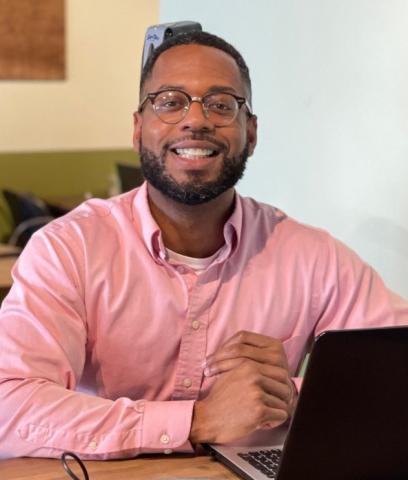Graduate Efforts Seeks to Improve Representation in Higher Education and Helping Professions

Growing up in a military family, Tyron Slack, a doctoral candidate at FSU, traveled internationally at an early age and became familiar with fitting into new settings and cultures. His immediate family played a strong role in helping him feel stable and supported during these stressful transitions. He stayed close to home and family while completing his undergraduate degree at Southeastern Louisiana University in psychology, but with a sincere desire to understand and help people in a meaningful way.
His interest in psychology compelled him to explore graduate programs, revealing to Tyron the highly competitive nature of higher education. Not giving up, a sociology professor told him about social work and other career paths that would allow him to provide direct care to people and communities most in need. Social work appealed to him and led him to apply and be accepted into the Master of Social Work program at Florida State University.
His MSW program meant leaving home and financially supporting himself. The start of an academic program represents one of the biggest and most challenging life transitions for many students. Navigating university culture and demands can be complex and debilitating. Tyron found himself in this situation. “My journey through my graduate education has been difficult to navigate. I felt like I have had to wade through most of my process alone,” he stated.
“Some of the biggest challenges for first-generation and under-represented students in college is finding a community to connect with that can support you on your academic and life journey,” Tyron underlined. “We are told to work hard and keep our heads down to stay out of trouble. But there is a lot of benefit to having a community and ‘village’ for networking, and academic and life success.”
Tyron considers himself fortunate that in the second semester of his master’s program, he landed a full-time job at Florida State’s Office of Accessibility Services as their office manager and van driver. He acknowledges their staff as, “integral in helping me adapt to the university environment and culture” and where he learned to navigate balancing student and professional life.
He further credits his experience at the Office of Accessibility Services as eye-opening when learning about the range of disabilities including those that are invisible or acquired. Mentor relationships with FSU College of Social Work faculty Keithen Mathis and Craig Stanley also were integral to Tyron's pursuit opportunities and provided social and navigational support. He still has a strong relationship with them almost a decade later, highlighting the value and necessity for networking.
After earning his MSW in 2016, he continued at FSU as an academic advisor with the FSU Center for Academic Retention and Enhancement. He worked with minority students with similar experiences to his own trying to navigate and succeed in their academic careers at a predominantly white institution. This experience stuck with him even when he moved on to serve as a social worker with the Veterans Health Administration. He worked with homeless military veterans diagnosed with substance use disorder and severe mental illness, who frequently had to navigate a complex healthcare system.
Tyron’s persistent interest in psychology and mentor support kept him working towards earning his doctoral degree. Now a doctoral candidate in the combined Counseling and School Psychology program at the FSU College of Education, his dissertation research examines how resilience can moderate the relationship between microaggressions and emotional distress of undergraduate Black students attending a predominantly white institution.
In 2022, he also established his own consulting business, Pursuing Purpose Consulting Services, originating from his own experiences and wish to help minority students and professionals enhance their experiences to become better candidates into doctoral programs, particularly psychology programs. Research from the American Psychological Association indicated that minorities make up less than 20% of active psychologists.
“There is research that supports success in therapy is not dependent on the color of the therapist, but research about minorities, especial about Black people, has historically been written from a deficit perspective. For instance, research has focused on negative stereotypes of Black people including being raised in a single parent household, minimal interest in education, or laziness as the reasons why Black students fall behind in education compared to their White counterparts “ he explained. “Having the field of psychology, along with other helping professions, be more welcoming can challenge this narrative and provide us with additional perspectives on the way under-represented communities exist and excel.”
Tyron intends to continue his career with the Veterans Health Administration after earning his doctorate, providing mental health therapy for military service members and veterans with post-traumatic stress or military sexual trauma. He also hopes to continue his business and research by continuing to collaborate with higher institutions to provide practical ways to support under-represented students.

